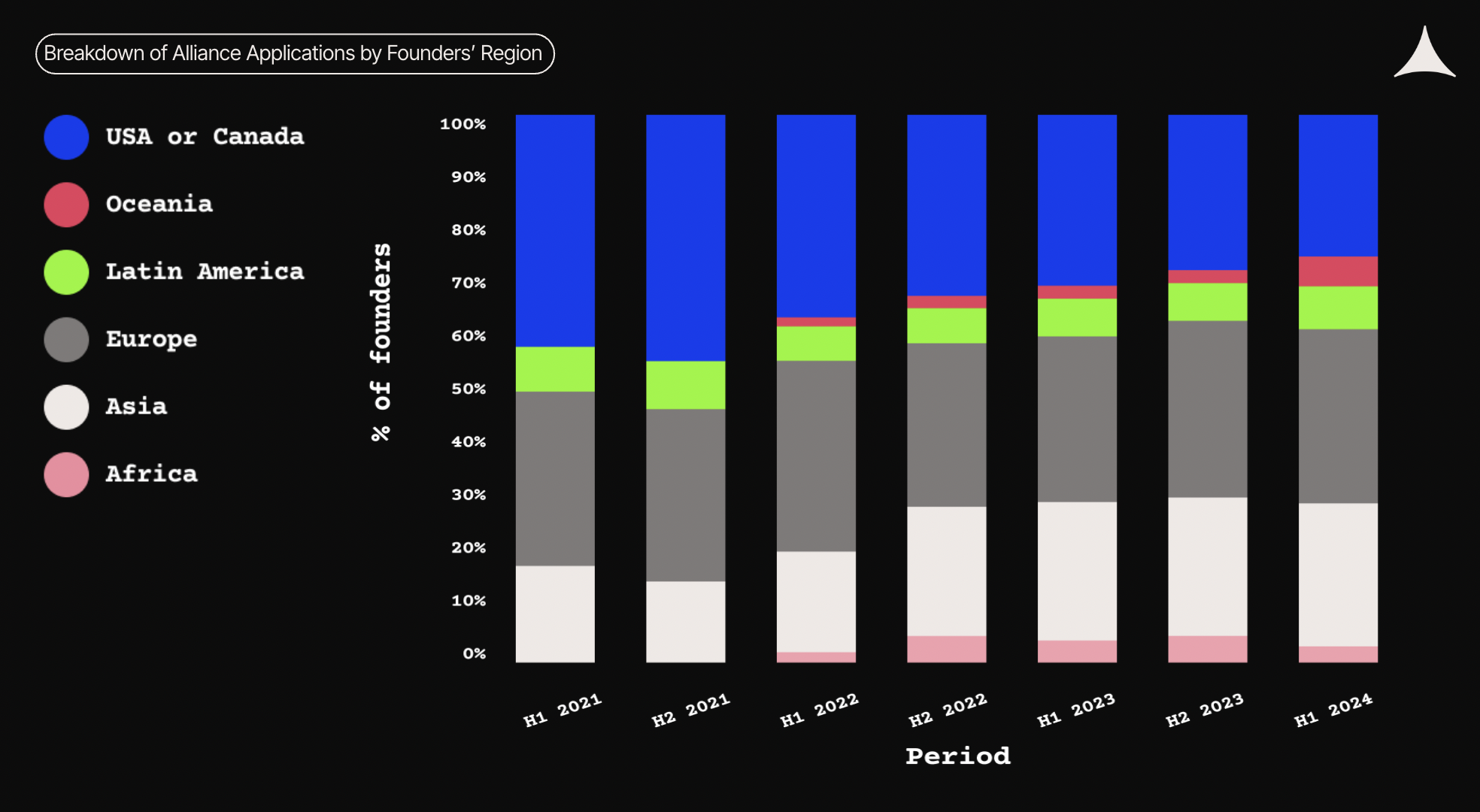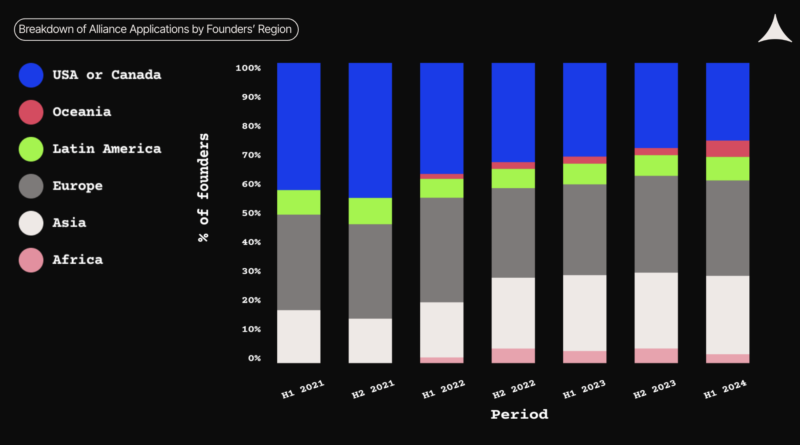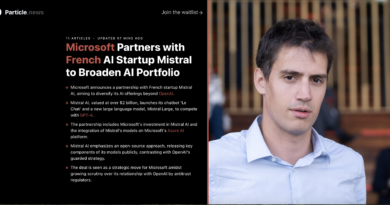Alliance DAO is attracting fewer US founders amid crypto crackdown
The graduates of Alliance DAO are often useful indicators of investor appetite and user adaption trends within the crypto space. The latest batch of the stage-agnostic crypto accelerator, unveiled today, comes at a moment of great excitement for the recovering market.
Just two months ago, Bitcoin hit its all-time high; though the value of the largest cryptocurrency has since declined, it continues to trade at much higher levels than during the market downturn following FTX’s implosion in late 2022. Venture investors are responding and plowing money into web3 startups, sending total fundraising in the space to roughly $1.9 billion in Q1, a sharp 58% jump from the quarter before, according to Crunchbase data.
The renewed enthusiasm among web3 believers is evidenced by catchphrases like “we are so back” that have filled crypto X/Twitter. In the meantime, regulatory efforts to rein in the industry have not waned. In the U.S., Binance’s Canadian founder Changpeng “CZ” Zhao is set to become the richest person to ever face imprisonment. Uniswap, which has been vocal about its decentralized approach to digital assets, received a notice from the U.S. Securities and Exchange Commission (SEC) last month.
Unsurprisingly, the ongoing crackdowns in the U.S. have a palpable impact on Alliance DAO’s geographic composition.

Image Credits: Alliance DAO
As shown in the graph (above) shared by Qiao Wang, one of the founding partners of Alliance DAO, founders based in North America accounted for 45% of the accelerator’s applicants in H2 2021; that share slipped to just 26% in H1 this year.
“Essentially, the U.S. is losing market share for crypto founders over the last three years. This is likely due to 1) regulations and 2) crypto finding product-market fit in emerging markets,” Wang told TechCrunch via email.
Indeed, the accelerator has seen a steady uptick in interest from Asia, which made up 24% of all applications in H1 2024, compared to 14% in H2 2021.
North America’s declining participation in Alliance DAO doesn’t imply founders simply abandon their crypto dreams. Historically, web3 entrepreneurs have been a flexible and nomadic tribe, fleeing crackdowns and seeking out more favorable regions. As a result, some of them may set up physical bases in emerging markets with a more amicable crypto environment.
As TechCrunch has reported, Asia has quickly become a popular destination for crypto entrepreneurs. The user base is large, young and open to new types of technology and financial assets. Several jurisdictions, including Hong Kong, Japan and Singapore, have taken notable steps to provide clearer regulatory frameworks for the budding sector, providing much reassurance to founders facing policy uncertainty elsewhere.
Meet the batch
Alliance DAO’s latest cohort, the 12th edition of its three-month program, received 1,503 applications. That marked a significant increase from the last batch’s 1083 applications. Just 21 teams were accepted this time, resulting in a competitive 1.4% acceptance rate. Twelve of them are presenting at today’s demo day.
Projects building on Ethereum, the most active blockchain by developer activity, are still the focus of this cohort, although other ecosystems like Solana and Bitcoin are “making a comeback,” according to Wang. Popular verticals seen across the batch include decentralized AI, crypto infrastructure (especially modular blockchain), decentralized finance (DeFi), and crypto-based payment solutions.
Now, let’s turn to the projects:
Company name: Villcaso
What it does: Permissionless U.S. real estate investing
Founders: Nathaniel Sokoll-Ward, Val Lee
The pitch: REITs, or real estate investment trusts, are designed to offer investors fractional exposure to real estate, lowering barriers to entry. While they offer more liquidity than traditional property investment, REITs are for the most part inaccessible to global investors, who make up an increasing share of total real estate investments in the U.S. Using a “fully legal permissionless token,” Villcaso is working to scale and distribute fractional ownership of U.S. real estate to a global audience. It has small equity positions in a large number of homes across the country.
Stage: Raising seed
Company name: GoBankless
What it does: Transferwise with stablecoins
Founders: Ygor Francisco, Khayalethu Mtshali
The pitch: GoBankless has its eye on Africa’s cross-border payments market that’s witnessing explosive growth. Businesses have been stuck with the long processing time and high settlement fees of traditional banks, while those that resist SWIFT’s monopoly are left facing counterparty risks in shadow markets. With the use of stablecoins, the startup is working to make cross-border payments instant without banking intermediaries. Today, GoBankless is serving around 50 small businesses across Mozambique and South Africa and settling $7 million in payments every month.
Stage: Raising seed
Company name: Wasabi Protocol
What it does: Leverage trading protocol
Founders: Eren Derman, Kemal Hasan Atay
The pitch: Crypto trading, especially longtail trading of new assets such as memecoins and NFTs, has seen a surge in daily volume. Popular platforms like Aevo and Hyperliquid allow users to gain early access, but they are “dependent on the market being sufficiently liquid,” leading to missed opportunities. Wasabi solves liquidity by backing user positions with underlying assets while its competitors take an algorithmic approach. Launched a few months ago, Wasabi’s total value locked (TVL) has grown to $60 million with over $200 million in volume.
Stage: Recently closed a seed round; raising a strategic round
Company name: Lulubit
What it does: Coinbase for Central America
Founders: Ianir Sonis, Diego Hernan Cabrera, Alan Futerman
The pitch: Central America is among regions that have shown a rapid pace of crypto adoption. Nonetheless, it’s still hard to even just buy and sell crypto in the region. P2P networks are unreliable while established exchanges charge high fees. Lulubit allows retail users in Central America to buy and sell crypto from their local banks and spend through the crypto debit card it issues; users can also send remittances on-chain to Lulubit and withdraw to their bank accounts at lower rates than the traditional method. Launched less than a year ago, Lulubit has amassed more than 18,000 users and processed over $1.3 million in volume in April alone, growing 36% month-over-month.
Stage: Raising seed
Company name: ZwapX
What it does: Marketplace for tokenized watches
Founders: Yohan Chiovetta, Noah Chiovetta, Rocco Di Capua
The pitch: The billion-dollar luxury watch market is enormous yet underserved by technological innovation. Peer-to-peer marketplaces are fraught with scams while B2C platforms face online authentication challenges. ZwapX offers a way for users to trade physical watches in the form of tokens, which act as certificates of ownership and authenticity. It has tokenized 44 watches to date with a $1.4 million TVL and a volume of $240,000.
Stage: Raising seed
Company name: Fractal Payments
What it does: Cross-border payments for global businesses
Founders: Pavel Skalin
The pitch: Money movement for businesses is one of the world’s biggest industries, yet it’s still suffering from perennial problems like high fees and slow processing. Fractal Payments is another startup aspiring to disrupt SWIFT with the use of stablecoins. Fully licensed in the European Union, it claims to make cross-border payments three times cheaper and six times faster than through legacy banking rails. It has facilitated more than $5 million in payments volume and working with a network of partners that support payments in over 60 countries.
Stage: Raising seed
Company name: Código
What it does: Crypto data for AI training
Founders: Jean-Philippe Emelie Marcos, Diego Besprosvan, Jaziel Guerrero
The pitch: Training data for AI is a billion-dollar market opportunity that has spawned unicorns like Scale AI. But existing solutions focus mostly on web2 use cases, with few powering AI training with crypto data. Código provides highly curated datasets to train specialized models for high-stake crypto applications, such as those involving financial transactions. Data is collected automatically through crowdsourcing, after which it is subject to a decentralized review and augmentation process where reviews can earn tokens. The tool has generated 4,000 dApps and four million lines of code within six months.
Stage: Raising seed
Company name: Accrue
What it does: Stablecoin payment network for Africa
Founders: Clinton Mbah, Adesuwa Omoruyi
The pitch: Bank transfers in Africa are notoriously costly and slow. Accrue aims to create a payment network that enables instant and affordable transactions — all powered by stablecoins. To that end, the startup is tapping the continent’s existing network of mobile tellers, which allow users to perform bank transactions over mobile phones, often simply through text messages. “10% of these mobile tellers are stablecoin-savvy,” and they are joining Accrue because it offers them more profit share and an upcoming token. The startup is cash-flow positive and has processed $5 million in payments.
Stage: Raising seed
Company name: Fig Investments
What it does: Tokenizing hedge fund strategies
Founders: Guanzhi Ma, Tony Qian
The pitch: The interest in decentralized finance (DeFi) services from traditional finance (TradFi) has surged, as seen in institutional players like Blackrock tokenizing stocks. Founded by banking veterans, Fig offers an automated trading desk that “matches TradFi interest in crypto with on-chain LP interest for returns.” It claims to be achieving a 10x scale than its competitor. Since launching four months ago, its TVL has grown to $10 million, with $40 million more in the backlog.
Stage: Raising seed
Company name: 0G
What it does: Modular AI chain
Founders: Michael Heinrich, Ming Wu
The pitch: 0G is building in the red-hot and cut-throat area of modular blockchain, which aims to help scale Ethereum transactions. Specifically, 0G is acting as a data availability layer, which ensures nodes in a blockchain network can access and verify transaction data. Its focus puts it in direct competition with well-funded projects such as a16z-backed EigenLayer, industry leader Celestia as well as Avail, which originated from Polygon. Using its unique technology, 0G claims it can achieve performance that’s 50,000 times faster than Celestia while costing 100x less than the rival.
Stage: Recently closed a 20x oversubscribed pre-seed round; raising seed
Company name: Proto
What it does: Google Maps on-chain
Founders: Akshay Yeleswarapu
The pitch: Despite the ubiquitous use of Google Maps, the application is surprisingly inaccurate in developing countries where cities are much denser than their Western counterparts and urban development happens rapidly. Proto wants to make navigation more accurate for underserved markets by crowdsourcing mapping data and allowing contributors to easily upload images with their mobile phones, a process incentivized by token rewards. Launched in late January, Proto has achieved 75% of Google Maps’ coverage of Bangalore through a network of 400 users.
Stage: Raising seed
Company name: Dinari
What it does: The global tokenized stock exchange
Founders: Gabriel Otte, Chas Rampenthal, Jake Timothy
The pitch: Global demand for U.S. securities has skyrocketed, yet access remains rather limited. Traditional brokerages have a high barrier of entry for foreign users, while early attempts to tokenize securities such as Ondo restrict certain features. Registered with the SEC, Dinari offers a way for non-U.S. investors to buy stocks via stablecoins. Its unique advantage is that its tokens are backed by real-world stocks. The platform’s TVL has grown to $500,000.
Stage: Closed a $10 million seed round; raising Series A
Alliance DAO invites a range of crypto experts to speak to cohorts about their domain knowledge. This time around, its guest mentors include Jacquelyn Melinek, founder of Token Relations and TechCrunch’s former crypto reporter; Jason Yanowitz, founder of Blockworks; Ming Ng, founder of Jupiter; Greg DiPrisco, founder of Ajna and M^0 Labs; Seung Yoon “SY” Lee, founder of Story Protocol; David Vorick, founder of Sia and Glow; and Ilja Moisejevs & Richard Wu, founders of Tensor.




